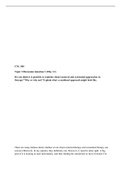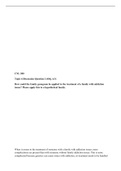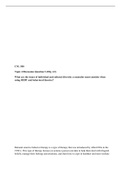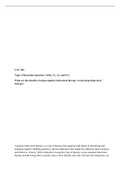Cnl 500 gcu - Study guides, Class notes & Summaries
Looking for the best study guides, study notes and summaries about Cnl 500 gcu? On this page you'll find 28 study documents about Cnl 500 gcu.
Page 3 out of 28 results
Sort by
Do you think it is possible to combine client-centered and existential approaches in therapy? Why or why not? Explain what a combined approach might look like.
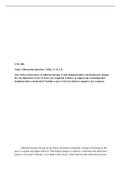
-
CNL 500 Topic 2 Discussion Question 1 (Obj. 2.1, and 2.3)
- Other • 2 pages • 2023
-
Available in package deal
-
- $10.49
- + learn more
CNL 500 (Theories and Models of Counseling) Topic 2 Discussion Question 1 (Obj. 2.1, and 2.3) Description: One of the cornerstones of Adlerian therapy is that insight produces motivation for change. Do you think that’s true? Is there any empirical evidence to support the contention that insight produces motivation? Include a peer reviewed article to support your response.
How could the family genogram be applied to the treatment of a family with addiction issues? Please apply this to a hypothetical family.
What are the issues of individual and cultural diversity a counselor must consider when using REBT and behavioral theories?
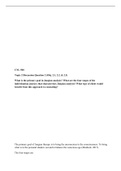
-
CNL 500 Topic 2 Discussion Question 2 (Obj. 2.1, 2.2, and 2.3)
- Other • 2 pages • 2023
-
Available in package deal
-
- $10.49
- + learn more
CNL 500 (Theories and Models of Counseling) Topic 2 Discussion Question 2 (Obj. 2.1, 2.2, and 2.3) Description: What is the primary goal in Jungian analysis? What are the four stages of the individuation journey that characterizes Jungian analysis? What type of client would benefit from this approach to counseling?
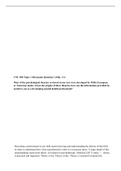
-
CNL 500 Topic 1 Discussion Question 1 (Obj. 1.3)
- Other • 2 pages • 2023
-
Available in package deal
-
- $10.49
- + learn more
CNL 500 (Theories and Models of Counseling) Topic 1 Discussion Question 1 (Obj. 1.3) Description: Most of the psychological theories reviewed in our text were developed by White European or American males. Given the origins of these theories, how can the information provided be useful to you as a developing mental health professional?
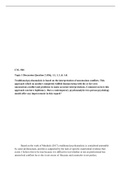
-
CNL 500 Topic 1 Discussion Question 2 (Obj. 1.1, 1.3, and 1.4)
- Other • 2 pages • 2023
-
Available in package deal
-
- $10.49
- + learn more
CNL 500 (Theories and Models of Counseling) Topic 1 Discussion Question 2 (Obj. 1.1, 1.3, and 1.4) Description: Traditional psychoanalysis is based on the interpretation of unconscious conflicts. This approach relied on another completely fallible human being with his or her own unconscious conflict and problems to make accurate interpretations. Comment on how this approach can have legitimacy. Does a contemporary psychoanalytic two-person psychology model offer any improvement in this regard?
What are the benefits of using cognitive behavioral therapy versus using behavioral therapy?

Study stress? For sellers on Stuvia, these are actually golden times. KA-CHING! Earn from your study resources too and start uploading now. Discover all about earning on Stuvia

